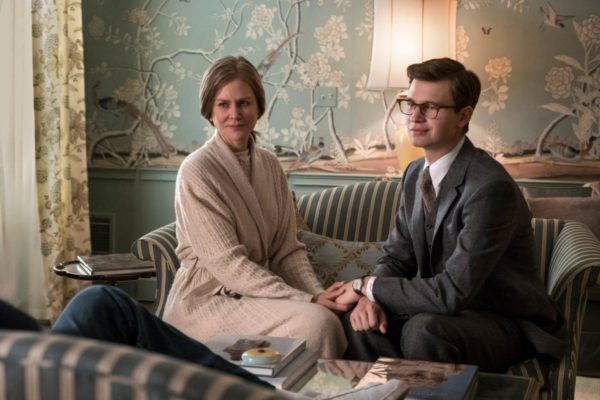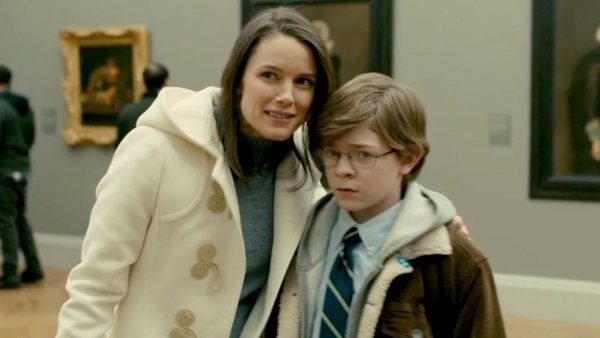The Goldfinch, 2019.
Directed by John Crowley.
Starring Ansel Elgort, Oakes Fegley, Aneurin Barnard, Finn Wolfhard, Sarah Paulson, Luke Wilson, Jeffrey Wright, Nicole Kidman, Ashleigh Cummings, Willa Fitzgerald, Denis O’Hare, Luke Kleintank, Peter Jacobson, Aimee Laurence, Nicky Torchia, Collin Shea Schirrmacher, Robert Joy, Joey Slotnick, Caroline Day, Pamela Dunlap, Ryan Foust, Misha Osherovich, and Jack DiFalco.
SYNOPSIS:
A boy in New York is taken in by a wealthy Upper East Side family after his mother is killed in a bombing at the Metropolitan Museum of Art.
The life of Theodore Decker (played as a child by Oakes Fegley and as an adult by Ansel Elgort, with the latter receiving far less screentime than expected and required, which is saying something for a beyond bloated 150 minute movie) is filled with tragic events and unfortunate situations, typically ones that go from bad to worse.
During the middle of The Goldfinch, his preteen self is under the guardianship of his neglectful and former alcoholic father (Luke Wilson) that not only mentally and physically abuses him, but also steals from his financial savings for gambling purposes. In one of many random scenes, dad bursts into the living room with handwritten instructions pleading his son to call a number and request funds for private schooling that will in actuality be used for a family restaurant business endeavor. Naturally, Theodore is uncomfortable doing this but nervously goes on with it after being smacked around. The plan still goes wrong, with dad subsequently breaking down as if we are watching a comedy despite literal child abuse taking place a moment prior. Soon after, tragedy strikes once again.
That’s just a sample of the tonal dissonance on display in The Goldfinch, a film that not even legendary cinematographer Roger Deakins (outside of a fantastical swimming pool sequence, there’s not much going on here) and John Crowley (director of the outstanding and Oscar-nominated Brooklyn) can save. Scripted by Peter Straughan (and based on the book by Donna Tartt), the movie clearly wants to showcase a downward spiral brought on by life-changing depressing moments and poor decisions that come from them as a result (one of the most prominent of subplots that go nowhere, and trust me, there are a lot of subplots here, involves Theodore getting hooked on drugs as a child inevitably becoming an addict as an adult). There is a hint of optimism early on as Theodore gets his wish to live with a friend’s family that plays an integral part of the story (the mother is played by Nicole Kidman), where he refines his inquisitive knowledge of paintings and antiquities.
Then, in a stretch that breaks all immersion, he’s taken away from the luxurious home and granted custody to the B-list celebrity father that abandoned him long ago, now romantically entangled with a woman played by Sarah Paulson that’s not exactly a fit replacement parent either. No one fights any of this, not even the owner of an antique store (Jeffrey Wright) who, at another point in the movie, professes that no one will ever take Theodore away from New York again. Maybe someone, anyone, should have done that the first time so Theodore’s already broken life didn’t become even messier, but this is the kind of Oscar-bait that abuses horrible things happening solely to elicit some kind of unearned emotional reaction. Admittedly, they are occasionally done with a degree of subtlety here, but that doesn’t make them any less overly melodramatic. Any character here that dies is done so for the sake of narrative convenience or milking the never-ending sadness of Theodore’s existence.
Despite how loopy and disconnected the overarching story is, Oakes Fegley does deliver a solid and mature performance with plenty of bits to sell the suffering wearing him down and other, more comical scenes, intended to show him as a child capable of having fun and vulgarly clowning around trying to move on. He also bonds with a European child of many ethnicities (mostly Russian) named Boris (Finn Wolfhard impressively taking a stab at heavier acting than something like It or Stranger Things) that makes for around 30 minutes of the film that are quite strong. Boris is more physically abused than Theodore, and absolutely a bad influence as the two take copious amounts of different drugs together, but it’s easy to ignore considering the healthy friendship they share that is a reprieve from all the toxicity they survive on a day-to-day basis. The chemistry between the performers is on point and charming, behaving badly and all.
Elsewhere, there are a number of women that are given nothing to do besides extending the internal pain of Theodore. If there is one connecting thread, however poorly executed it may be, it is the loss of Theodore’s mother at the hands of a terrorist bombing on an art gallery where he feels guilt and responsibility over for placing his mother there. As a child, he visits a surviving girl his age of the same senseless attack named Pippa (the effects done to create huge patches of her hair missing is a nice aesthetic detail, and for all I know maybe that transformation was actually accomplished without digital work) and develops another friendship before she moves to Texas to live with her nearest relative. Adult Theodore also has a love interest, that like everything else goes nowhere, and is punctuated with inflicted pain. One potential significant other is not enough, but there is one thoughtful dialogue exchange that emerges over dinner within one of them, and that’s all that should be said about that.
If that wasn’t enough, The Goldfinch shifts genres entirely during its third act to become a drug dealing crime thriller where the titular painting slips into the wrong hands. It also says a lot about how disastrous the storytelling is when it takes 800 words for me to actually bring up this historical artifact that carries a sentimental purpose, somewhat preserved to be a grand reveal near the end, although anyone that has ever seen a movie before will figure it out without even watching the trailer. Make no mistake, this is a terrible movie only made tolerable due to the ensemble cast giving it their best efforts. Good things assuredly can come from bad, but nothing good is coming from this adaptation of The Goldfinch.
Flickering Myth Rating – Film: ★ ★ / Movie: ★ ★
Robert Kojder is a member of the Chicago Film Critics Association and the Flickering Myth Reviews Editor. Check here for new reviews, friend me on Facebook, follow my Twitter or Letterboxd, check out my personal non-Flickering Myth affiliated Patreon, or email me at MetalGearSolid719@gmail.com














